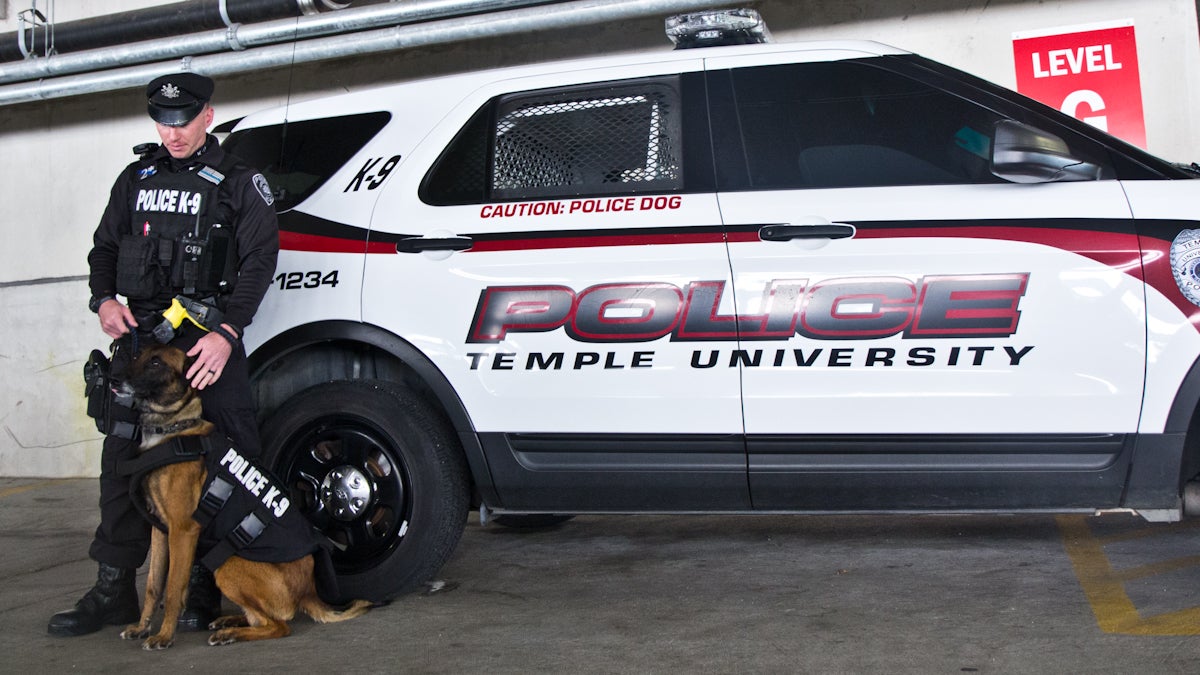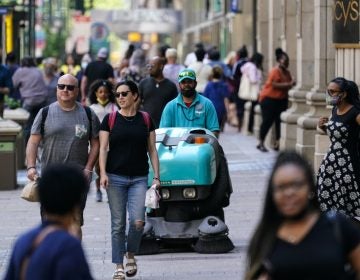Keeping guard and chasing danger, dogs increasingly patrol college campuses [video]

Temple University K9 Officer Doug Hotchkiss says police dog Baron has many roles on Temple’s campus. (Kimberly Paynter/WHYY)
Two of Temple University’s busiest police officers walk everywhere on a leash and get paid in head scratches and chew toys.
Baron, a 4-year-old Belgian Malinois, and Jarvis, an 8-year-old golden retriever, are police canines who patrol more than 200 acres across several Temple campuses. With just a few sniffs and whiffs, Baron and Jarvis can check a room for unseen threats faster than a phalanx of their human counterparts.
Temple is one of many colleges and universities nationwide that are letting security go to the dogs. In this region, several schools have police canines: Yellow labs Socks and Zzisa patrol the University of Pennsylvania; chocolate lab Hemi works at Stockton University in Atlantic County, N.J.; German shepherd Tito is on the Rowan University police force in Gloucester County, N.J.; and German shepherds Scout and Panzer patrol the University of Delaware.
“They are becoming more popular, mostly for explosives detection. Many universities tend to have important people coming through, so the dogs do security sweeps,” said Annemarie DeAngelo, a retired New Jersey State Police trooper who founded the force’s canine unit and now serves as training director at the Penn Vet Working Dog Center.
Beyond explosives detection, most campus canines also are trained in tracking and criminal apprehension, DeAngelo said.Campus forces that use canines have seen an unexpected benefit too, she added.
“It’s just nice to have a dog around,” she said. “People can pet them, and it really helps with the community-policing aspect. They can really help the students destress, especially during exam week.”
Terrorism fears drove Temple to get its first K9, Jake, about eight years ago, said Charlie Leone, who heads Temple’s police force, the largest at any university nationwide. “Post 9/11, we started seeing a tremendous increase in calls around campus,” Leone said.
Since then, Leone said, both dogs have gone far beyond campus borders to help where needed. Baron, Jarvis and their handlers Officers Doug Hotchkiss and Larry Besa helped in the hunt for Eric Frein, a fugitive wanted in the September 2014 ambush murder of a Pennsylvania State Police trooper. Baron also helped Philadelphia police track the carjackers who hit and killed a mother and three children in North Philadelphia in the summer of 2014.
On campus, they keep busy checking on forgotten backpacks and making sure buildings are safe for visiting dignitaries.The dogs especially can help police calm unruly crowds, Hotchkiss said.
“No one wants to get bitten,” Hotchkiss said. “You could have a dozen officers try to get a crowd under control. I bring out the dog, and they calm right down.”
Elsewhere, using police canines in college communities hasn’t always gone smoothly.
In Norfolk, Va., the city police chief last spring fired four officers after a police canine attacked a Norfolk State University student when she refused to answer officers’ questions as she left an off-campus party in January 2015. London Colvin, 22, an Army reservist, needed surgery and 43 stitches to close gashes in her leg after the dog attacked her as officers held her down. City officials agreed in March to pay her nearly $200,000, in exchange for her not suing the city.
And schools that use dogs for drug detection have fielded complaints from civil-rights advocates, who cite studies showing that drug dogs can err, resulting in unjustified searches.
But drug detection isn’t in Baron or Jarvis’ repertoire.And a panting, bright-eyed Baron sparked smiles when Hotchkiss ran him through some training exercises recently near Temple’s bell tower.
“He’s cute,” said Rebecca Dublin, 27, a post-graduate student who lives in Northern Liberties. “There are a lot of public safety concerns on this campus. He just adds another layer of safety.”
Hani Johnson, 28, an undergraduate from West Philadelphia, agreed: “To be prepared is better than not to be prepared. I get alerts (from the university) every few days about robberies, burglaries, all sorts of crimes. If this helps, then it sounds like a good idea.”
WHYY is your source for fact-based, in-depth journalism and information. As a nonprofit organization, we rely on financial support from readers like you. Please give today.




